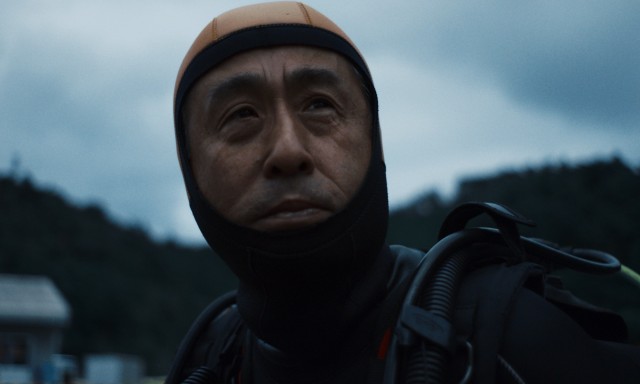On March 11th, 2011, in East Japan, a powerful tsunami took the lives of thousands. That day was the last time Yasuo Takamatsu saw his wife. Twelve years later, Yasuo has not given up on searching for her and every weekend explores the depths of the ocean. In his short documentary, The Diver, director Anderson Wright (Nzingha) paints a deeply moving picture of love, grief and the act of remembrance through the life of Yasuo.
Wright first heard about Yasuo back in 2016 and having read several articles about him, the director admits that “everything about his story totally floored me”. He later reached out over Facebook, and so began their collaboration in the making of this film. Explaining that as time went by, “warmth, thoughtfulness, and a good sense of humor began to emerge from his stoic demeanor”, Wright aimed to capture Yasuo’s emotional journey through a compelling visual aesthetic.
There is something incredibly beautiful in the idea of this man refusing to give up, and who keeps on honoring his love for his wife by going to look for her every weekend, for over a decade. Wright subtly establishes that love in the exposition, before making it ubiquitous throughout the runtime of the film, with how he brings Yasuo’s experience to the screen. Shot by Dop Christopher Lew, his lens feels very delicate, as it reveals the pain of his loss, while every single frame is beautifully constructed to create a truly cinematic film.

Yasuo Takamatsu on one of his hundreds of diving trips, searching for his wife’s body.
Yasuo’s loneliness is also part of his story, so after reading several quotes describing grief as “the silence of absence”, Wright opted for a more quiet approach than usual with the film’s sound design and employs this to immerse the audience in Yasuo’s headspace. The fact that Yasuo reveals his vulnerabilities on camera, allows the film to have emotionally powerful moments even when he isn’t saying a word, almost turning his wife’s absence into a character of its own. Through Christian Stropko’s sound work on the short, Wright is able to recreate how personal and intimate Yasou’s experience with grief is present in every aspect of his life, even the most mundane ones.
The topic of the film could lead anyone to assume that this will be a dark and negative watch, but Wright subverts expectations and makes it into something so much more. His strong rapport with Yasuo allowing him to paint a moving picture of his commitment to his wife and there is sheer beauty in how that is translated to screen in Wright’s directorial choices. As the short concludes and we leave Yasou sitting at his table, with his wife’s recovered phone in his hand, discussing fate, it’s only then the true impact of this nine-minute film begins to settle in.

 Céline Roustan
Céline Roustan